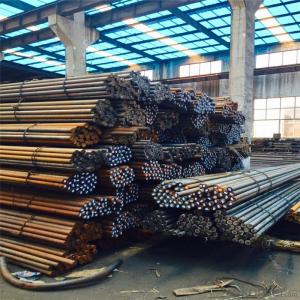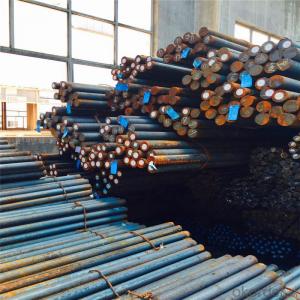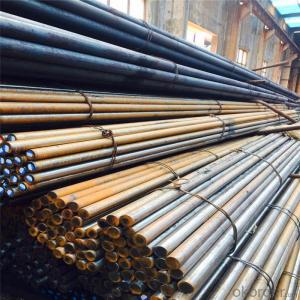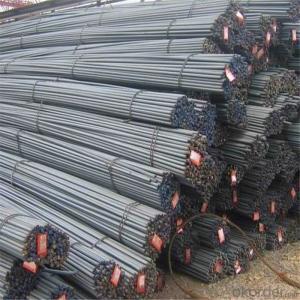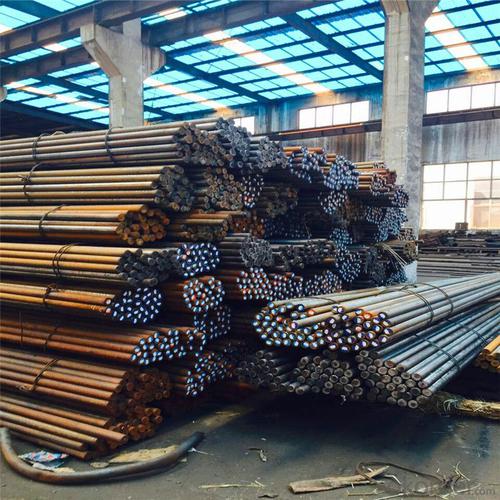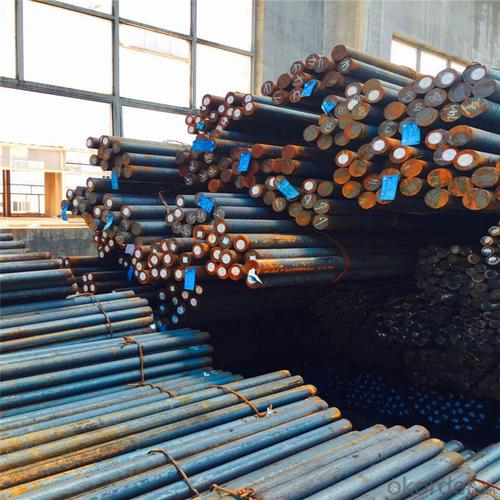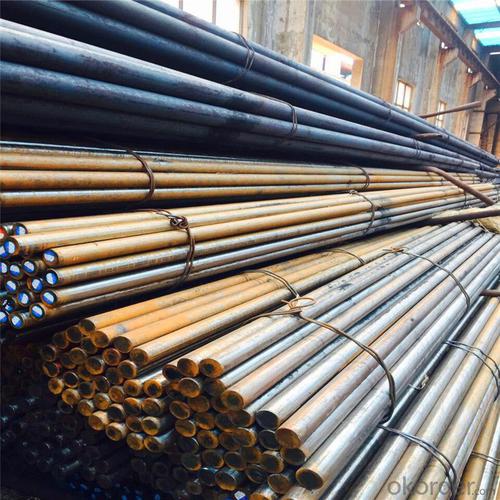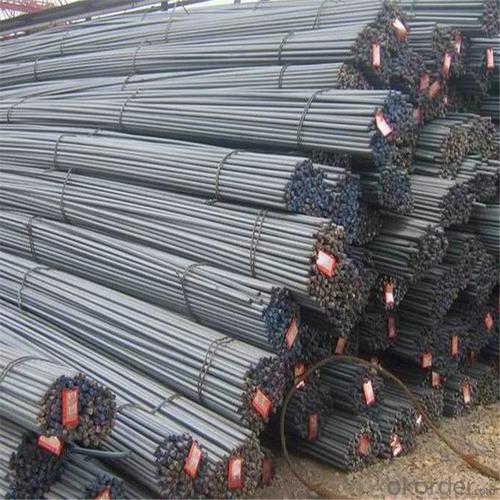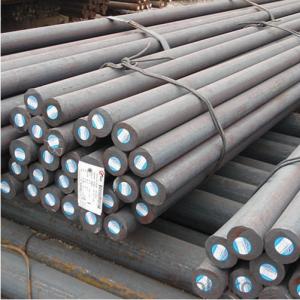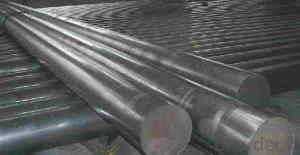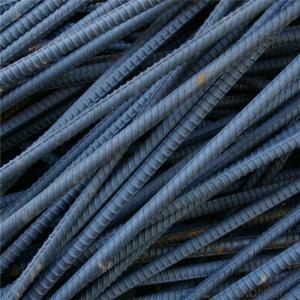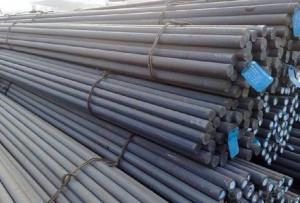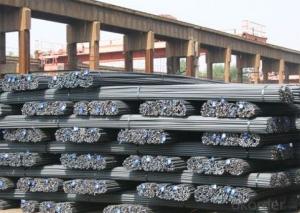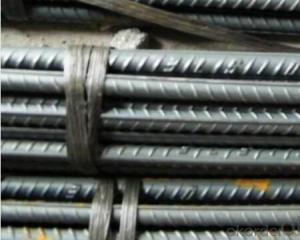Nationnal Factory HRB500 Reinforcement Steel Bar
- Loading Port:
- Tianjin
- Payment Terms:
- TT or LC
- Min Order Qty:
- 100 m.t.
- Supply Capability:
- 500000 m.t./month
OKorder Service Pledge
OKorder Financial Service
You Might Also Like
Specification
Nationnal Factory HRB500 Reinforcement Steel Bar
Description of HRB500 Reinforcement Steel Bar
1, Diameter: 5.5mm-10mm HRB500 Reinforcement Steel Bar
10m- 40mm HRB500 Reinforcement Steel Bar
2, Length: 6m, 9m, 12m or customized
3, Standard: GB, ASTM, AISI, SAE, DIN, JIS, EN
Produce Process: smelt iron - EAF smelt billet - ESR smelt billet -
hot rolled or forged to get the steel round bar and plate
3, Heat Treatment: annealing, normalizing, tempering, quenching
4, Surface Treatment: Black
5, Quality Assurance: We accept third party inspection for all orders.
You can ask testing organizations such as SGS, BV, etc. to test our products before shipping.
Chemical Composition of HRB500 Reinforcement Steel Bar
Grade | Technical data of the original chemical composition(%) | |||||
Reinforcing steel bar HRB335 | C | Mn | Si | S | P | B |
≤0.25 | ≤1.60 | ≤0.80 | ≤0.045 | ≤0.045 | >0.0008 | |
Physics Capability | ||||||
Yield Strength(N/cm2) | Tensile Strength(N/cm2) | Elongation(%) | ||||
≥ 335 | ≥490 | ≥16 | ||||
Reinforcing steel bar HRB400 | C | Mn | Si | S | P | B |
≤0.25 | ≤0.16 | ≤0.80 | ≤0.045 | ≤0.045 | 0.04-0.12 | |
Physics Capability | ||||||
Yield Strength(N/cm2) | Tensile Strength(N/cm2) | Elongation(%) | ||||
≥ 400 | ≥ 570 | ≥ 14 | ||||
Products Show of HRB500 Reinforcement Steel Bar
Company Information
CNBM International Corporation is the most important trading platform of CNBM group.
Whith its advantages, CNBM International are mainly concentrate on Cement, Glass, Iron and Steel, Ceramics industries and devotes herself for supplying high qulity series of refractories as well as technical consultancies and logistics solutions.


F A Q
1, Your advantages?
professional products inquiry, products knowledge train (for agents), smooth goods delivery, excellent customer solution proposale
2, Test & Certificate?
SGS test is available, customer inspection before shipping is welcome, third party inspection is no problem
3, Factory or Trading Company?
CNBM is a trading company but we have so many protocol factories and CNBM works as a trading department of these factories. Also CNBM is the holding company of many factories.
4, Payment Terms?
30% TT as deposit and 70% before delivery.
Irrevocable L/C at sight.
5, Trading Terms?
EXW, FOB, CIF, FFR, CNF
6, After-sale Service?
CNBM provides the services and support you need for every step of our cooperation. We're the business partner you can trust.
For any problem, please kindly contact us at any your convenient time.
We'll reply you in our first priority within 24 hours.
- Q: How is special steel tested for quality and durability?
- Special steel is tested for quality and durability through a series of rigorous processes and tests. These tests are designed to ensure that the steel meets the required standards and can withstand various conditions and applications. One common method used to test special steel is the tensile strength test. This test measures the maximum amount of stress that the steel can withstand before breaking or deforming. It is conducted by applying a pulling force on a sample of the steel until it reaches its breaking point. The results of this test determine the steel's ability to resist external forces and its overall strength. Another important test is the hardness test. The hardness of the steel is a critical factor in determining its durability. This test involves measuring the resistance of the steel to indentation or scratching. The steel sample is pressed against a hard surface, and the depth of the indentation is measured. The harder the steel, the more resistant it is to wear and deformation. In addition to these mechanical tests, special steel is also subjected to various chemical and metallurgical tests. These tests help determine the chemical composition and microstructure of the steel, which are crucial factors in ensuring its quality and durability. For example, spectroscopic analysis is used to determine the exact chemical composition of the steel, while metallography allows for the examination of the steel's microstructure, including the presence of any impurities or defects. Furthermore, various non-destructive testing methods are employed to assess the steel's internal structure without causing any damage to the material. These methods include ultrasonic testing, magnetic particle inspection, and radiographic testing. Ultrasonic testing uses high-frequency sound waves to detect any internal flaws or defects in the steel, while magnetic particle inspection relies on the application of magnetic fields to identify surface cracks or discontinuities. Radiographic testing, on the other hand, uses X-rays or gamma rays to examine the internal structure and detect any defects that may compromise the steel's quality and durability. Overall, the testing of special steel for quality and durability is a comprehensive process that combines mechanical, chemical, metallurgical, and non-destructive testing methods. Through these tests, manufacturers can ensure that the steel meets the required standards and can perform reliably in various applications, thereby guaranteeing its quality and durability.
- Q: What are the main factors affecting the cost of special steel?
- The main factors affecting the cost of special steel include the cost of raw materials, such as iron ore and other alloying elements, as well as energy costs for the production process. Additionally, market demand and supply dynamics, production capacity, labor costs, and transportation expenses also play a significant role in determining the cost of special steel.
- Q: What are the different chemical resistance grades of special steel?
- Special steels, often referred to as stainless steels, are known for their excellent resistance to corrosion and chemical attack. They are a group of alloys that contain a high proportion of chromium, which forms a protective oxide layer on the surface, preventing further corrosion. The resistance of special steel to various chemicals can vary depending on the specific grade or alloy composition. Here are some of the common chemical resistance grades of special steel: 1. Austenitic Stainless Steel: This is the most common type of stainless steel and offers excellent resistance to a wide range of chemicals, including organic acids, alkalis, and salts. The most widely used grade within this group is 304 stainless steel. 2. Ferritic Stainless Steel: Ferritic stainless steels have lower corrosion resistance compared to austenitic grades but still offer good resistance to many chemicals. They are particularly resistant to nitric acid and some organic acids. Grade 430 stainless steel is a common example of ferritic stainless steel. 3. Martensitic Stainless Steel: Martensitic stainless steels are known for their high strength and hardness. While they have lower corrosion resistance compared to austenitic and ferritic grades, they can still exhibit good resistance to certain chemicals, especially in mildly corrosive environments. 4. Duplex Stainless Steel: This type of stainless steel combines the properties of both austenitic and ferritic grades, providing enhanced strength and improved resistance to stress corrosion cracking. Duplex stainless steels offer excellent resistance to a wide range of chemicals, including organic acids, chloride-containing solutions, and saltwater. 5. Precipitation-Hardening Stainless Steel: These steels can be heat-treated to achieve high strength and corrosion resistance. They are typically resistant to a wide range of chemicals, including organic acids, alkalis, and some organic solvents. It's important to note that the chemical resistance of any steel grade can also be influenced by factors such as temperature, concentration of the chemical, and the presence of other corrosive agents. Therefore, it is advisable to consult the manufacturer's specifications or seek expert advice when selecting a special steel grade for specific chemical resistance requirements.
- Q: Can special steel be used in the power generation equipment manufacturing industry?
- Yes, special steel can be used in the power generation equipment manufacturing industry. Special steels, such as high-strength or heat-resistant alloys, are often utilized in the manufacturing of turbine components, boiler tubes, and other critical parts of power generation equipment. These steels offer superior mechanical properties, resistance to high temperatures, and corrosion resistance, making them suitable for the demanding operational conditions in the power generation industry.
- Q: What are the different nitriding techniques used for special steel?
- There are three main nitriding techniques used for special steel: gas nitriding, salt bath nitriding, and plasma nitriding. Gas nitriding involves exposing the steel to ammonia gas at high temperatures, resulting in the diffusion of nitrogen into the surface. Salt bath nitriding involves immersing the steel in a bath of molten salt containing nitrogenous compounds, allowing for nitrogen diffusion. Plasma nitriding, on the other hand, uses a low-pressure plasma to bombard the steel surface with nitrogen ions, creating a hardened layer. Each technique offers unique advantages and is chosen based on the specific requirements and properties desired for the special steel.
- Q: What are the different surface hardening techniques used for special steel?
- There are several surface hardening techniques used for special steel, including carburizing, nitriding, induction hardening, flame hardening, and laser hardening.
- Q: What are the specific requirements for special steel used in the chemical reactor industry?
- The specific requirements for special steel used in the chemical reactor industry can vary depending on the specific application and the type of chemicals being processed. However, there are some general requirements that are typically expected for this type of steel. Firstly, the steel used in chemical reactors must have excellent corrosion resistance. Chemical reactors often handle highly corrosive substances, such as acids, alkalis, and other reactive chemicals. Therefore, the steel must be resistant to the corrosive effects of these substances to ensure the integrity and durability of the reactor. Secondly, the steel should have high temperature resistance. Chemical reactions often require high temperatures to facilitate the desired chemical transformations. The steel used in these reactors must be able to withstand these elevated temperatures without losing its structural integrity or undergoing any significant deformation. Furthermore, the steel should have good mechanical properties, including high strength and toughness. The reactor may experience high pressure and mechanical stress during operation, so the steel must be able to withstand these conditions without failure. Additionally, the steel used in chemical reactors should have good weldability and formability. This allows for ease of fabrication and construction of the reactor, ensuring a reliable and efficient manufacturing process. Moreover, the steel should have low levels of impurities, such as sulfur and phosphorus. These impurities can adversely affect the performance of the steel in terms of corrosion resistance and mechanical properties. Therefore, the steel must meet strict quality standards to ensure it is suitable for use in the chemical reactor industry. In summary, the specific requirements for special steel used in the chemical reactor industry include excellent corrosion resistance, high temperature resistance, good mechanical properties, weldability, formability, and low levels of impurities. Meeting these requirements is crucial to ensure the safety, reliability, and efficiency of chemical reactors in various industrial processes.
- Q: What are the properties of duplex stainless steel?
- Duplex stainless steel is known for its excellent combination of corrosion resistance and high strength. It has a two-phase microstructure consisting of equal amounts of ferrite and austenite, which provides it with superior toughness and resistance to stress corrosion cracking. Additionally, duplex stainless steel offers good resistance to pitting and crevice corrosion, making it suitable for use in various harsh environments. It also exhibits good weldability and is highly durable, making it a popular choice in applications such as chemical processing, oil and gas industries, and marine environments.
- Q: How does special steel perform in nuclear applications?
- Due to its exceptional properties and performance, special steel holds significant value in nuclear applications. Nuclear reactors operate under extreme conditions, enduring high temperatures, pressures, and radiation exposure. Designed specifically for these demanding circumstances, special steel, also known as nuclear-grade steel or reactor-grade steel, can withstand them. One of the primary characteristics of special steel lies in its remarkable strength and toughness. This quality enables it to resist deformation and fractures, even under the intense stress and pressure present in nuclear reactors. Additionally, special steel exhibits superior heat resistance, ensuring its structural integrity remains intact at elevated temperatures. This feature is critical to prevent any potential failures or structural damage that could jeopardize the safety and efficiency of the nuclear system. Moreover, special steel possesses exceptional resistance to corrosion and oxidation. The highly corrosive environments within nuclear reactors, caused by various chemical compounds and high-temperature water or steam, make this corrosion resistance indispensable. It ensures the longevity and reliability of reactor components while minimizing the risk of radioactive material release. Furthermore, special steel is designed to have low neutron absorption properties. By reducing neutron absorption, special steel helps optimize the performance and efficiency of the nuclear system. This is vital as neutron absorption can lead to the formation of unwanted isotopes that could interfere with nuclear reactions or contribute to the production of radioactive waste. Overall, special steel is a critical material in nuclear applications. Its provision of necessary strength, heat resistance, corrosion resistance, and low neutron absorption ensures the safe and efficient operation of nuclear reactors. Its exceptional performance guarantees the integrity of the system, minimizes accident risks, and contributes to the overall sustainability of nuclear energy.
- Q: What are the safety considerations when working with special steel?
- When working with special steel, some important safety considerations include wearing appropriate personal protective equipment such as gloves, safety glasses, and steel-toed boots to protect against potential hazards. It is crucial to handle the steel carefully to avoid injuries like cuts, punctures, or strains. Additionally, workers should be cautious of the high temperatures that may be involved during the manufacturing or shaping process and take necessary precautions to prevent burns. Proper training and knowledge of the specific properties and handling techniques of the special steel being used are also essential for ensuring a safe working environment.
Send your message to us
Nationnal Factory HRB500 Reinforcement Steel Bar
- Loading Port:
- Tianjin
- Payment Terms:
- TT or LC
- Min Order Qty:
- 100 m.t.
- Supply Capability:
- 500000 m.t./month
OKorder Service Pledge
OKorder Financial Service
Similar products
Hot products
Hot Searches
Related keywords
